As the new government of nuclear-free New Zealand leans towards joining the anti-China bloc, critics warn of weakened sovereignty in a sea of expanding militarization, Mick Hall reports.
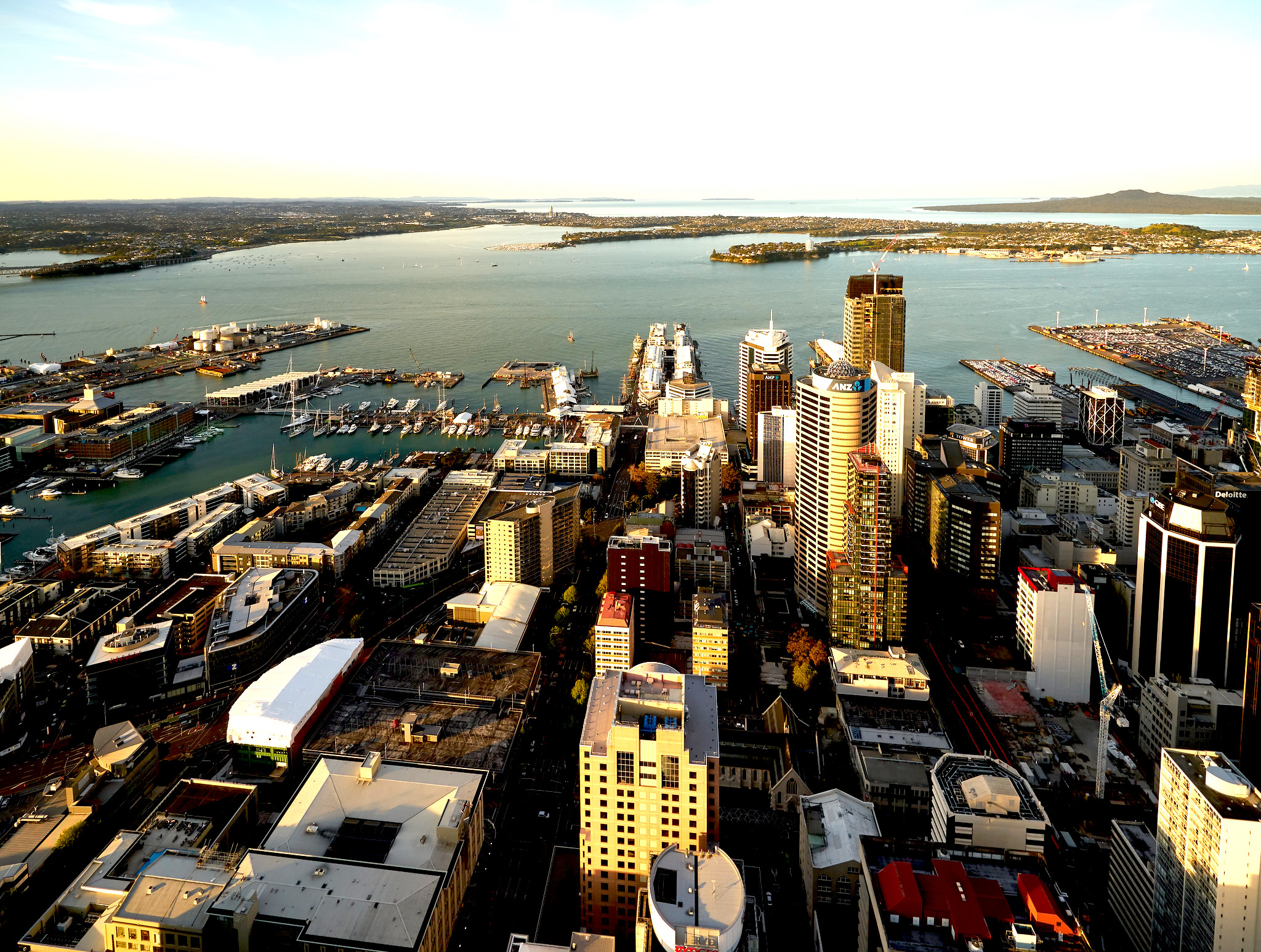
Auckland, New Zealand, from the Sky Tower, 2018. (Pedro Szekely, Flickr, CC BY-SA 2.0)
By Mick Hall
in Whangarei, New Zealand
Special to Consortium News
 Concerns are rising for peace and sovereignty in the Pacific after strong signals from New Zealand’s new government that it wants to swiftly join the U.S.-led military alliance AUKUS.
Concerns are rising for peace and sovereignty in the Pacific after strong signals from New Zealand’s new government that it wants to swiftly join the U.S.-led military alliance AUKUS.
If New Zealand does join the U.S.-led military bloc it would effectively compromise the country’s long-held anti-nuclear policy, Marco De Jong, historian and co-director of the New Zealand foreign policy group Te Kuaka, told Consortium News.
He said the decision would put an end to what is left of the nation’s independent foreign policy, as well as its image as an “honest broker” in a region already divided by increasing militarization.
The 2021 AUKUS agreement among Australia, the U.K. and the U.S. centers on the tripartite development of a nuclear submarine fleet within a security partnership geared to upholding the “rules-based international order,” as well as a “free and open Indo-Pacific.” Though not stated explicitly, it is seen as an anti-China alliance, based on a hyped-up threat of Beijing to the region.
It is controversial in Australia because the decision to join AUKUS with an AU$368 billion price tag for the submarines was continued by Prime Minister Anthony Albanese (following its initiation by the previous prime minister Scott Morrison) without any consultation with Parliament, let alone the public.
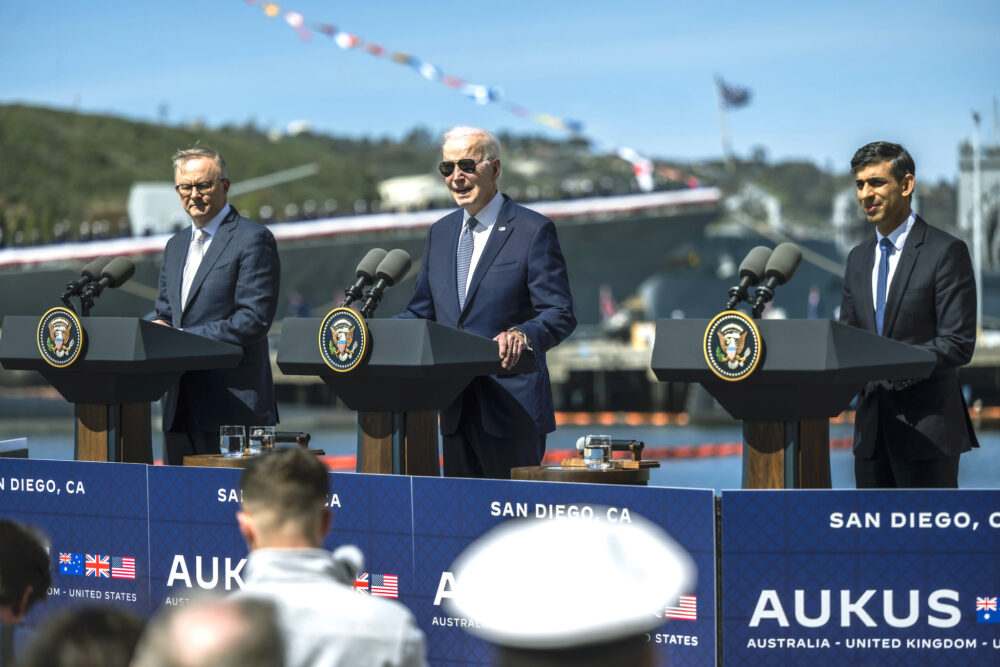
Australian Prime Minister Anthony Albanese, U.S. President Joe Biden and British Prime Minister Rishi Surnak at a press event for AUKUS in San Diego, March 13, 2023. (DoD photo by Chad J. McNeeley)
There is dissension in Albanese’s Labor Party, and former Labor Prime Minister Paul Keating, four days after the event in San Diego, publicly ripped the deal.
Keating said Australia was
“now part of a containment policy against China. The Chinese government doesn’t want to attack anybody. They don’t want to attack us … We supply their iron ore which keeps their industrial base going, and there’s nowhere else but us to get it. Why would they attack? They don’t want to attack the Americans … It’s about one matter only: the maintenance of U.S. strategic hegemony in East Asia. This is what this [AUKUS] is all about.”
By subordinating itself, Keating said Australia is forfeiting its sovereignty to rely on Britain, which abandoned its former colony years ago, to build nuclear submarines that serve U.S. — and not Australian — interests.
[See: A Sane Voice Amidst the Madness]
Nevertheless the deal is still on track. It was announced in March that SNN-AUKUS nuclear submarines would be delivered to Australia by the early 2040s and the U.K. by the late 2030s.
A bill passed in the U.S. Congress on Thursday cleared the way to sell three-to-five Virginia-class submarines to Australia in the interim by the early 2030s.
New Zealand’s Path
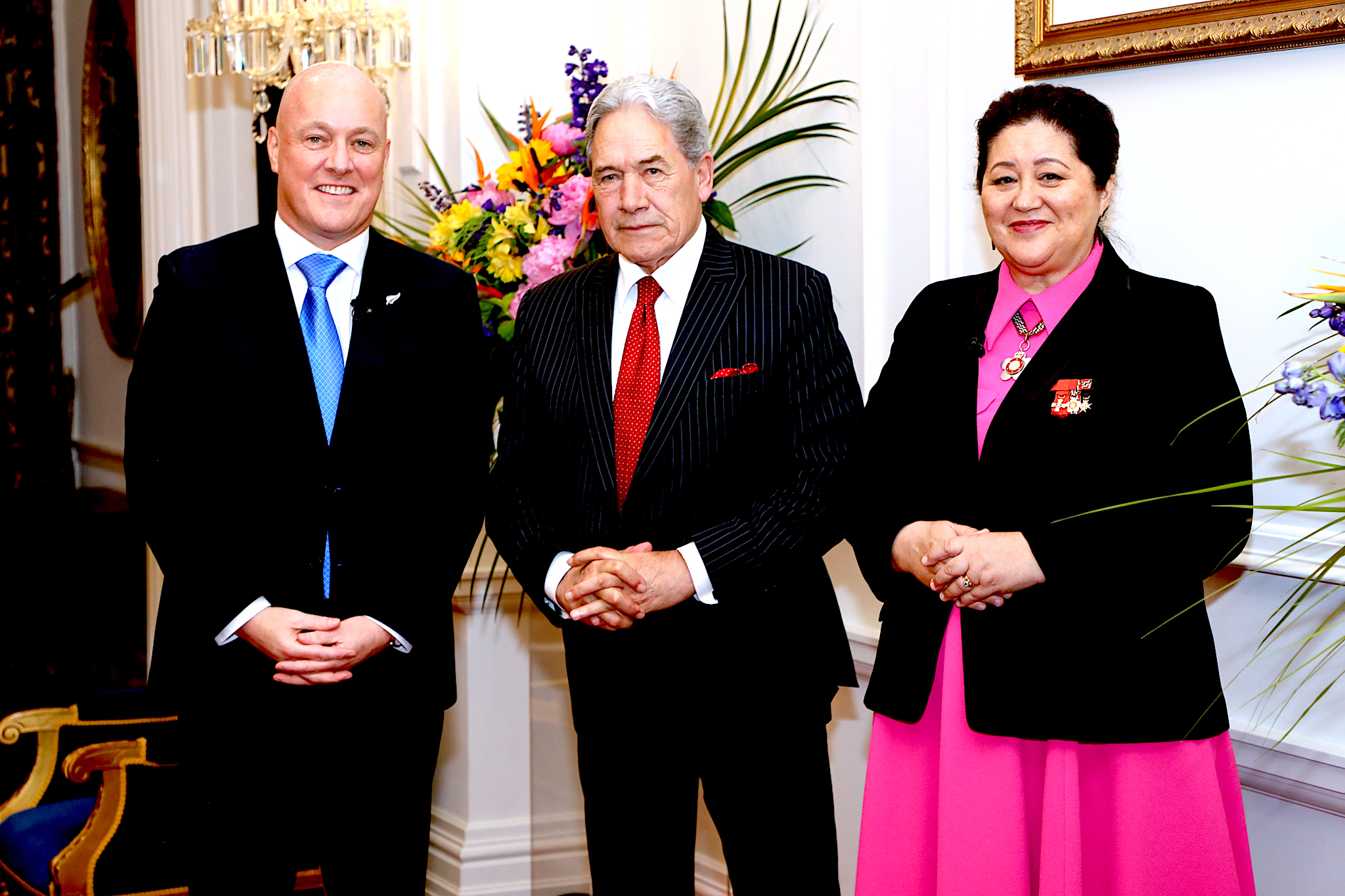
New Zealand’s Prime Minister Christopher Luxon with Winston Peters, deputy prime minister and minister of foreign affairs, and Governor-General Dame Cindy Kiro at the appointment of the new government on Nov. 27. (Doug Mountain, Wikimedia Commons, CC0)
New Zealand now may be about to go down a similar path. The country’s government is one of the most right-wing in decades, a coalition made up of the centre-right National Party and two junior partners, including far-right libertarian party ACT and national party New Zealand First.
Early statements by ministers indicate its foreign policy settings will be much more closely aligned to the Anglosphere and U.S. geo-strategic interests.
Support for the centrist Labour government in October’s general election collapsed in the absence of any transformative intentions, as neoliberal monetary policy tackled inflation by imposing higher costs on the public while helping banks make record profits.
Pre-election, then Prime Minister Chris Hipkins stated he was open to conversations about joining Pillar II of AUKUS, reported to involve a non-nuclear brief, including integration of cyber, quantum computer technology and AI into military operations.
After U.S. Secretary of State Antony Blinken visited Wellington for talks in July, Hipkins emphasized Pillar II was only being considered as a “hypothetical” possibility, as it was still being defined.
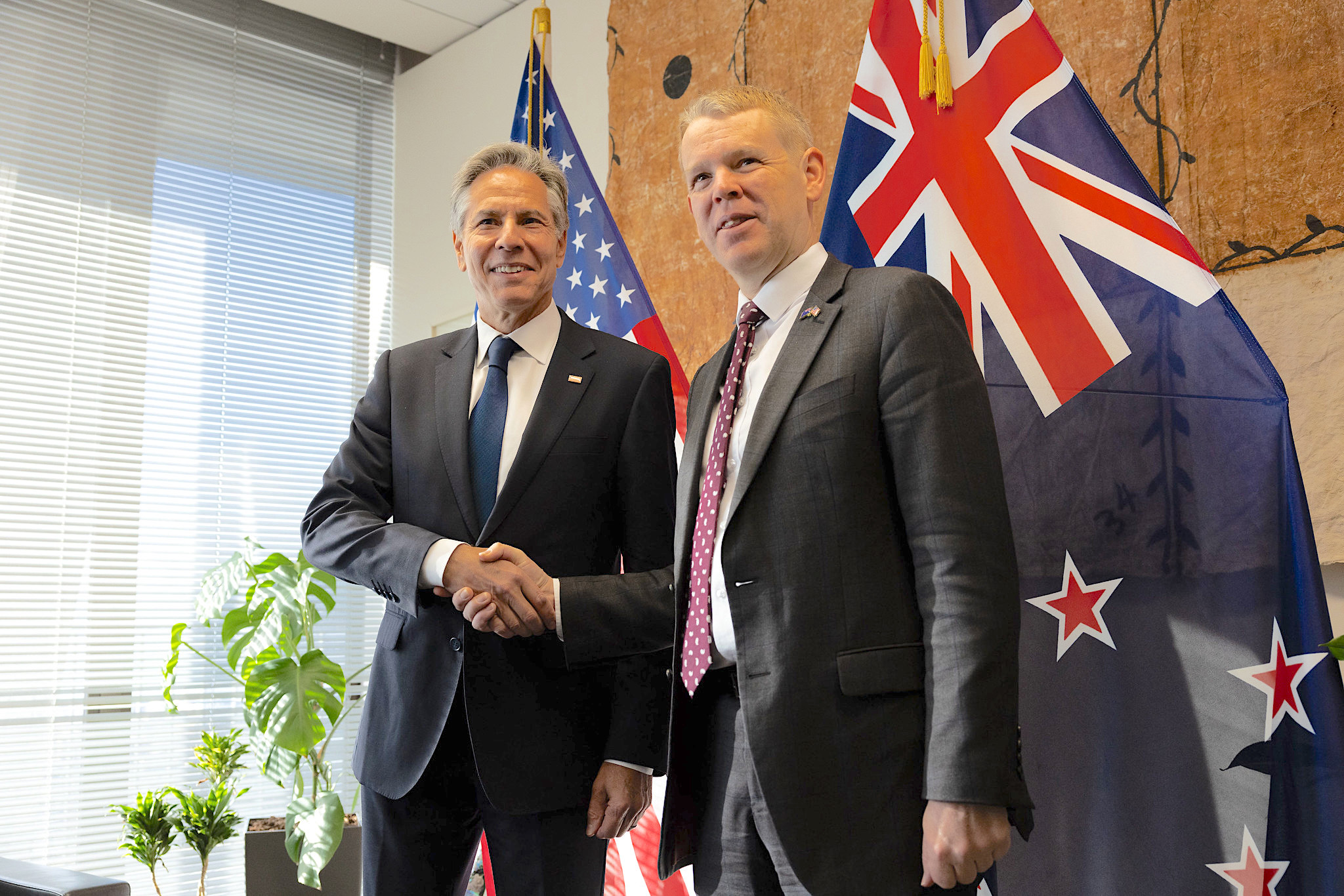
Blinken with Hipkins in Wellington on July 27. (State Department, Chuck Kennedy, Public domain)
Nuclear-Free
New Zealand became an anti-nuclear nation in 1987, declaring a Nuclear Free Zone, Disarmament and Arms Control Act that effectively banned U.S. nuclear submarines from its waters.
It led to New Zealand being frozen out of the ANZUS security treaty and allowed the country to develop a more independent policy engagement with the Pacific and the rest of the world.
It has enjoyed good diplomatic relations with China, now its largest trading partner.
However, the U.S. is creating a security dilemma in the region as it attempts to contain peer rival China in its own sphere of influence, while forcing small nations to pick sides in the great-power competition now playing out.
Some Pacific leaders have already warned the U.S. quest for primacy is creating a destructive rivalry and dangerous geopolitical blocs in a region where peace has been underpinned by economic interdependence, regional cohesion and inclusivity.
New Zealand has at least 30 government agencies active in the region and its goal, as set on in its overarching Pacific Reset policy document, is to build a “stable, prosperous and resilient Pacific.” It has signed up to “Blue Pacific” principles of regionalism and Pacific-led solutions to challenges like climate change and economic development.
In a speech to the United States Business Summit in Auckland on Nov. 30, Foreign Minister Winston Peters repeated those goals, but said the U.S. was instrumental to the Pacific’s success.
Sending Signals
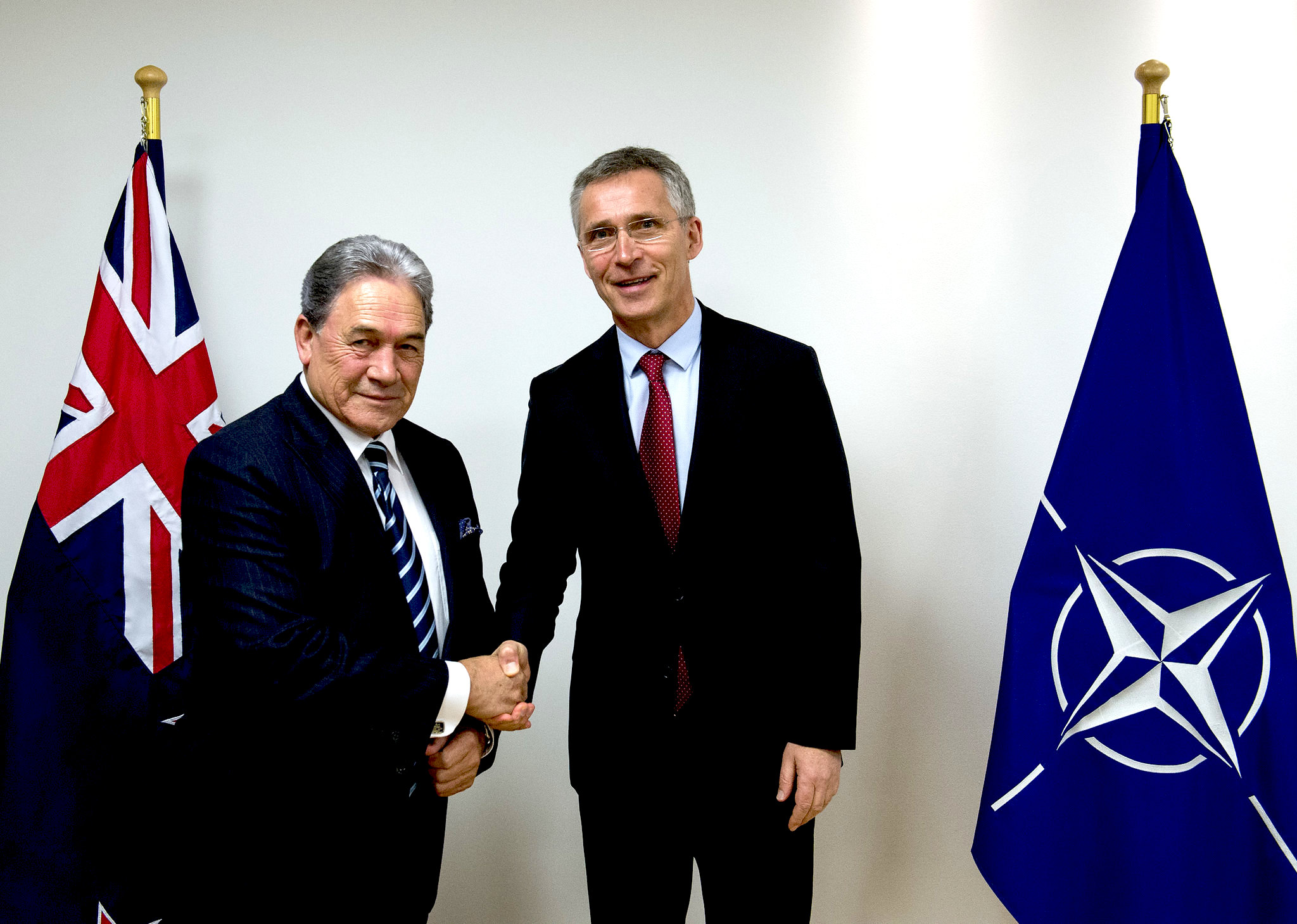
New Zealand’s Winston Peters with NATO Secretary General Jens Stoltenberg in Brussels in 2018. (Flickr, NATO, CC BY-NC-ND 2.0)
Both China and the U.S. have been investing in the region. China has been exercising its “soft power” by building infrastructure for nations on a “no strings” basis, while giving billions of dollars in foreign aid over recent years and offering loans on more favorable terms than those of Western financial institutions.
Peters said New Zealand wanted to “strengthen engagement with the U.S. on strategic and security challenges, centered on our common interest in a stable, peaceful and prosperous Indo-Pacific” by contributing to solving “international and regional security challenges, working alongside the U.S. and our many other partners.”
He added: “We know moving with the speed and intensity required to meet current challenges is going to require all of us to step up. New Zealand stands ready to play its part.”
Please DONATE to CN‘S Winter Fund Drive
In a speech to diplomats on Monday, Peters also said the government would “vigorously refresh” security cooperation with Five Eyes partners U.S., Australia, Canada and the U.K., “as well as with other key security partners in the region and beyond.”
He claimed the previous government had created a Pacific “vacuum” that needed to be addressed urgently.
A day later his colleague, Defence Minister Judith Collins, was even more forthright, accusing the previous government of taking “an anti-American stance” and criticizing it for not having joined Pillar II already. [On that same day this week, however, New Zealand continued to oppose the United States in the U.N. General Assembly by voting for an immediate ceasefire in Gaza, joining Five Eyes partners Canada and Australia.]
The Government can sign up to Pillar II if the country’s attorney-general considers it compatible with the constitution, but would be expected to debate its merits in Parliament and seek cross-party support.
Kiwi Opponents
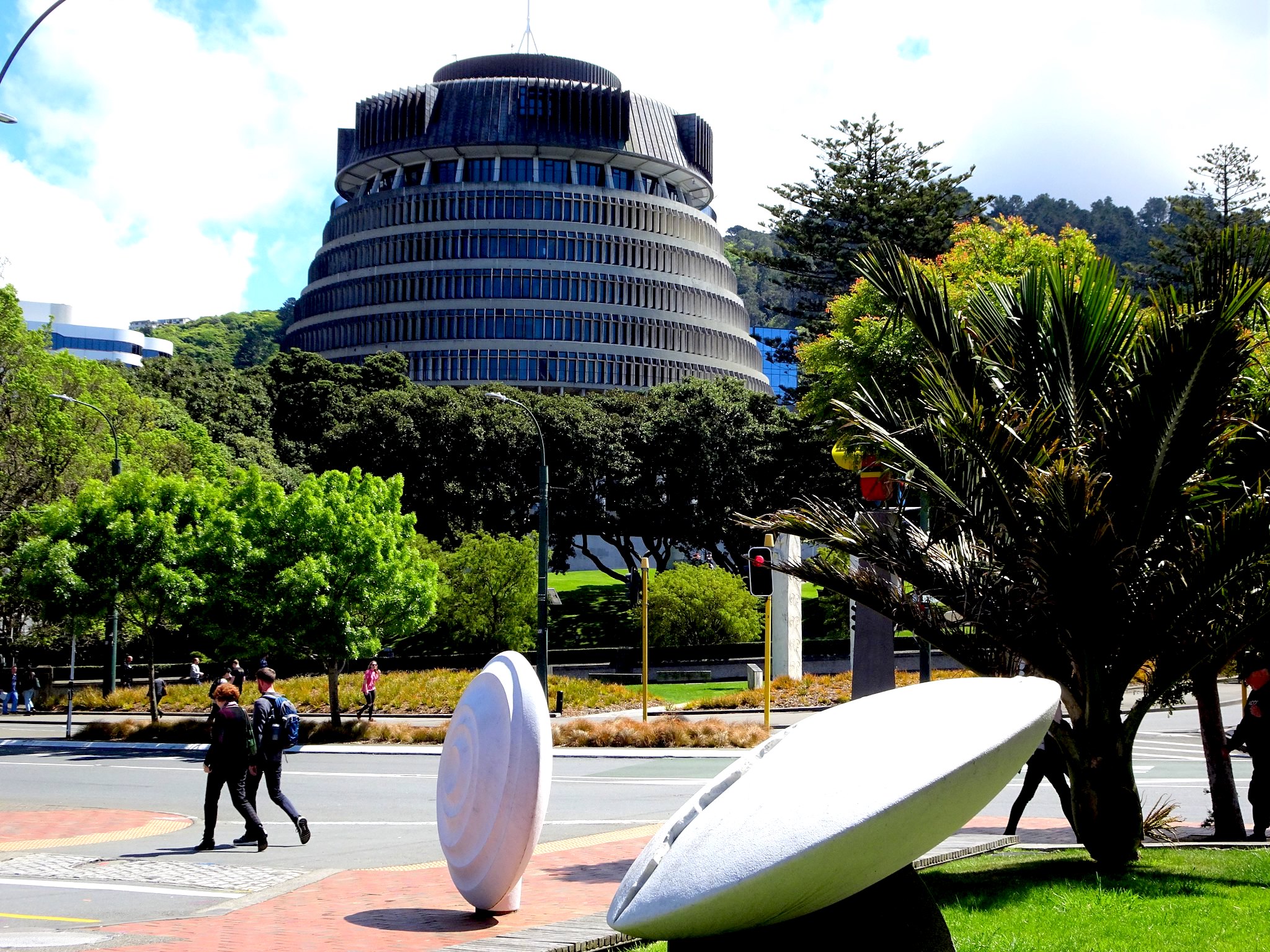
New Zealand’s national Parliament, locally known as the Beehive, in Wellington. (denisbin, Flickr, CC BY-NC-ND 2.0)
The new government’s aggressive signaling of intent has alarmed many, particular given the absence of public debate over the consequences of involvement in the alliance.
“I’m extremely concerned, mainly because neither major party campaigned on AUKUS,” de Jong told Consortium News. He said:
“There was no clear consensus pre-election that this was something that would be pursued. The new Prime Minister [Christopher] Luxon has repeatedly stressed bipartisanship on foreign policy, so I think it’s profoundly undemocratic, to have a Foreign Minister from a minor coalition party signal something like this within the first week.
There has been no sustained public debate about what it can entail, about the opportunity costs, and that it’s something that Pacific nations don’t want. It’s something that Maori don’t want. Deeper integration with the military industrial base of the Anglosphere is something that we should be incredibly concerned about for New Zealand and its standing in the region and in the world.”
Sharing this again, as New Zealand faces a generational foreign policy decision.
I have advocated against New Zealand involvement in AUKUS Pillar II this year in the belief that would weaken New Zealand and threaten our independent, nuclear free, and Pacific-led foreign policy. https://t.co/ti5iMMh72e— Marco de Jong (@MHdeJong) December 12, 2023
De Jong speaks for Kiwi opponents of joining AUKUS when he said it would ultimately add to a loss of sovereignty in the region generally, leaving New Zealand effectively rudderless in a sea of increasing militarization.
“If we can’t stand up for nuclear non-proliferation, if we can’t stand up for the rights of small states not to have to choose between superpowers, we stand to lose,” he said.
There is now a fear that a commitment to Pacific priorities and ways of doing politics will be jettisoned by New Zealand to accommodate a U.S.-led engagement in the region, one that has assimilated Australia with already destructive consequences.
A number of Pacific countries have recently faced deep internal tensions over defense pacts signed with the U.S. and Australia.
The Australia-Tuvala “faleipili” deal, signed in November, stands to give Canberra control of Tuvalu’s fishing rights and national security within its territorial waters. Negotiated in secret, without any public consultation, it has been slammed as an act of acceding sovereignty by former Prime Minister Enele Sopoaga.
Papua New Guinea was hit with protests in Moresby in May over the conditions of a maritime and defense deal with the U.S., which many also say compromises the nation’s sovereignty.
‘Bad Diplomacy’
“We see the AUKUS desire, that necessity to have unfettered access to Pacific lands and waters, causing regional political instability and if New Zealand goes down that AUKUS route, we can’t bully or buy our friends like Australia and the U.S. can,” de Jong said. “We can’t afford to do that. It’s bad diplomacy. It weakens New Zealand, and it jeopardizes our place in the region and it jeopardizes the long-held ties that M?ori and Pacific people have.”
It would also affect New Zealand’s nuclear-free policy. Signing up to Pillar II did not mean New Zealand would be excluding itself from involvement in nuclear warfare either, de Jong said.
“Even though AUKUS pillar II has been portrayed as a non-nuclear element of the pact that involves technology sharing, critics point out the pact itself operates a military doctrine of nuclear war-fighting and that Pillar II suggests creating a single, integrated AI-driven system, where information might be exchanged between conventional and nuclear platforms.”
Left-wing Indigenous party Te Pati Maori, which won six seats in Parliament in October, wants New Zealand to be non-aligned and to remain out of great power machinations underway.
Co-leader Rawiri Waititi told Consortium News his party feared for the nation’s sovereignty if AUKUS Pillar II was pursued. He called for a “democratic process” to be followed before any decision was made.
“We’re deeply concerned with the implications this has on Aotearoa’s independence and ability to remain militarily neutral,” he said, adding:
“As Maori we cannot allow our sovereignty to be determined by others, whether they are in Canberra or Washington. Aotearoa should not act as Pacific spy base in the wars of imperial powers.
Joining AUKUS will severely undermine our country’s sovereignty, constitution, and ability to remain nuclear free. There is too much at stake for our government to make a commitment of this magnitude without a democratic process.”
De Jong said the journey towards AUKUS involvement had been far from democratic. He talked of a process of “breadcrumbing” during the previous government’s tenure, where ministers had been led up a path of militarism by unelected securocrats pushing the pact as a rational political response to rising geopolitical competition.
Military Preparation
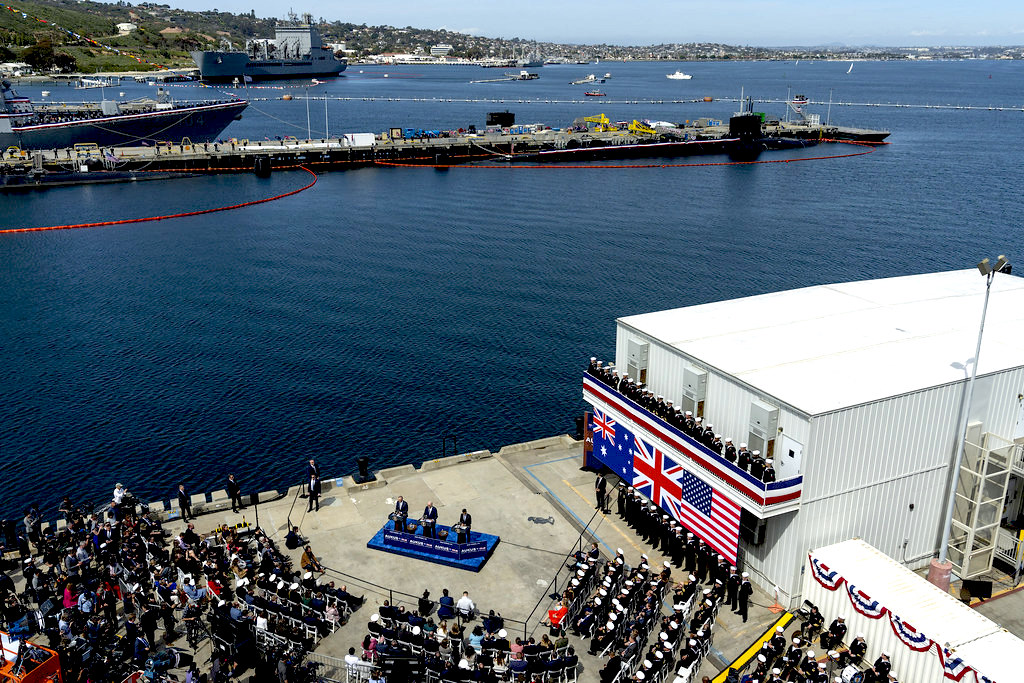
U.S. President Joe Biden, U.K. Prime Minister Rishi Sunak and Australia’s Albanese talking up their security partnership on March 13 at Point Loma Naval Base in San Diego. (White House)
In August the government released three defense, security and intelligence reports, all pointing to supposed threats faced by New Zealand amid rising tensions between an “increasingly assertive” and authoritarian China and the U.S., a traditional partner who valued openness and shared liberal democratic values.
The documents each set out moves the government was taking and should take to prepare militarily in defense of its sovereign interests and those of its partners.
Former Prime Minister Helen Clark at the time echoed de Jong’s concerns — that agenda-setting, faceless security officials were preparing the political ground for AUKUS.
“There must be sustained public debate,” de Jong said.
“It is the most significant foreign policy decision in a generation. Not since New Zealand left AU in 1987 has there been such an important foreign policy decision and what we’ve seen is a shadow foreign policy from, in fact, that the deepening of ties with America has not happened with transparency or accountability.
There has been constant obfuscation and constant obstruction from the Ministry of Foreign Affairs (Mfat) on this matter, instead of public, sustained public engagement. What they’ve being involved in is an agenda-setting and threat escalating exercise, which serves nobody. Openness and transparency are not threats to democracy or national security. But a lack of openness and transparency, which in turn is a threat to our relationships with other countries.
We’re seeing the loss of sovereignty in multiple nations and we’ll end up that way too if we let a small cadre of defense and unelected officials determine our foreign policy in the shadows.”
Geopolitical experts have increasingly talked of U.S. hegemony being under threat, particularly with the rise trading bloc BRICS-plus.
Several centers of economic and political power are now emerging out of a post-Soviet space of unipolarity of U.S. power, underpinned by a doctrine of “full-spectrum dominance,” defined by its policy makers as the ability to control any situation or defeat any adversary across the range of military theaters.
In order to maintain its hegemony, the U.S. has sought to contain its peer rivals leading the charge to multipolarity, namely Russia and China.
In the case of China, Taiwan is seen as instrumental in doing so. China views Taiwan as an integral part of its territory and is seeking “peace reunification” with the self-governing island.
U.S. has recognized the territorial claim under its One China policy as its official diplomatic position, while maintaining ‘strategic ambiguity’ to it. That position is becoming less ambiguous.
Many geopolitical observers believe the U.S. is seeking to prepare a proxy war in the Pacific as a means of weakening China’s power. It has stoked tensions by stocking up Taiwan with weapons while backing its independence movement, raising fears of a Chinese military intervention.
U.S. President Joe Biden has warned it will defend the island if China “invades.” The AUKUS alliance would play a key role in any confrontation.
A spokeswoman for the NZ Ministry of Foreign Affairs (Mfat) told Consortium News the Pillar II of AUKUS “included cooperation on emerging security issues, including areas (such as cyber) in which we already work closely with Australia, the U.S. and the U.K.”
She said officials were engaged with AUKUS partners to better understand the details of Pillar II, but decisions about possible participation would be for ministers in due course.
She added New Zealand was committed to supporting regional security and was already long-standing contributor to Pacific-led regional security mechanisms.
“In line with Pacific preference, we have been clear with all our international partners that engagement in the Pacific should take place in a manner which advances Pacific priorities, is transparent, is consistent with established regional practices, and supportive of Pacific regional institutions,” the spokeswoman said.
Mick Hall is an independent journalist based in New Zealand. He is a former digital journalist at Radio New Zealand (RNZ) and former Australian Associated Press (AAP) staffer, having also written investigative stories for various newspapers, including the New Zealand Herald.
CORRECTION: AUKUS was initially agreed to by former Australian Prime Minister Scott Morrison on Sept. 15, 2021 and Albanese decided to continue it, without public or parliamentary debate. Albanese vigorously defended the deal against internal opposition at the Labor Party conference in Brisbane this year.
Please DONATE to CN‘S Winter Fund Drive



The U.S. of amerca, dealing the dope of death so it can maintain it’s own habit!
The AUKUS submarine deal is nothing but a hyper-expensive a farce. The following comes from the Asia Times Online:
The ability to detect nuclear subs is only going to improve into the future and this is a critical point missing from the AUKUS debate. In 20 years time AIs will probably know precisely where nuclear subs are due to mix and match new sensor tech.
Because nuclear subs are state of the art today doesn’t mean they will remain so into the future. It is insane to base Australia’s defence on nothing more than hope that nothing will change when change is the only thing that can be guaranteed.
Yet for the same money as 5 nuclear subs we could buy 250,000 Tomahawk-type missiles that are more mobile and way easier to maintain.
Consider which would offer greater deterrence: 5 entirely visible subs or the ability to rain down a quarter million advanced missiles on an invasion force at ranges up to 1,500km.
$A370 billion would provide a lot of jobs if the missiles were to be 100% Australian made and our international balance of trade would not indenture our grandkids to foreign debt peonage. Compared to being at the mercy of foreign suppliers, the strategic benefit of being able to ramp up domestic production in times of crisis would be incalculable.
A home grown missile program would massively enhance Australian sovereignty rather than it being inversely diluted under AUKUS. We would be able to defend ourselves without relying on allies.
Withour AUKUS Australia could become truly independent. Why NZ wants to join in the AUKUS farce is beyond me.
I salute you sir ! Absolutely sane assessment of the geo-strategic picture into the future. Even to face a purely hypothetical threat from China this would be too foolishly exorbitant an outlay.
New Zealand needs to get its head on straight. Many of us in the United States are feeling we no longer live in a democracy. It is a sham and a fraud that the powers that be project to the world. There are many complaints about the government taking better care of the apartheid state of Israel than it does of its own people. USA is a country known for throwing its allies under the bus if and when they are no longer useful. Think about it very carefully. Listen to your people, not the corrupted government of the USA.
“….its image as an “honest broker”…”
My impression is that NZ’s image took a hit over the Ukraine situation. Despite the fact that it must be well-aware of what has been happening there since the US-sponsored 2014 putsch in Kiev, it has sided with the EU and offered support to the Zelensky régime.
A young relative has observed that the citizens (including the children) of the Donbass have never done anything to this country, yet the government supports the régime which has been persecuting them since 2014. This hasn’t gone unnoticed in other parts of the world.
“The country’s government is one of the most right-wing in decades…”
I’m an old Lefty. I voted for a change of government, not just because the previous iteration was blindingly incompetent, but because of its authoritarianism, and its chicanery over He Puapua.
In the 2020 election, it won an absolute majority. Talk about undemocratic: it didn’t campaign on He Puapua: we found out about it only after the election, when the government began ramming through legislative changes aimed at co-governance, including the hated 3 Waters, and undermining the democratic process over local authority seats.
I’m not in general a fan of the new government’s foreign policy. More particularly, I don’t favour NZ becoming part of AUKUS. But that may be the price we must pay for the government fulfilling its promise to end co-governance.
I’m so embarrassed by this. So utterly ashamed that my country is so poorly led. That one awful, odious, self-serving and corrupt politician who barely scraped into parliament by stirring up grumps, cranks and malcontents, can now negotiate himself into foreign minister and thus take the entire country down a ruinous path… purely and entirely only for his personal self-aggrandizement. Luxon fancies himself a sharp business leaders but as a political novice, has shown he is easily controlled by his supposedly junior coalition partners.
Labour, I blame you. If you had governed more wisely, with less ideology, then you would not have allowed this unholy coalition to take over our country. Mind you, frankly, you were cowed into sucking on the WEF teat yourselves. Only the Maori Party remains to represent an independent moral voice for NZ.
Would some kindly witch-doctor please raise Lange back from the dead? We need him again now…
“Would some kindly witch-doctor please raise Lange back from the dead? We need him again now…”
Oh please, no! It seems that you’re unaware of what actually happened back then. I know about it: I was a voting adult at the time. The very last person we need is Lange. I suggest that you do some reading on the topic.
A sure sign of fear of being frozen out of the western military and cultural war the US is spearheading for the profit of the permanent war technology race to infinity. An increasingly expensive addiction to costly dominance by force systems that threaten all of human civilization with ruin. Resources that will be needed to maintain the entire world civilization system.
It is also fear of any other cultural system and religion on a parity economic basis rather than being gouged for excessive profits for the god given superior right of a self serving mythology that has fueled empires for centuries in wars and war technology that is in a runaway process condition. This not civilized behavior but simply dominance behavior.
So perfectly written! I do not understand why NZ must take a militaristic stance siding with the most warring nation that has ever existed. Look at the EU;, and their decline since they followed the U.S. into the Ukraine conflict. Militarization can only lead to more wars, of which NZ needs none of. Nobody wants to invade NZ, this U.S. pressure to militarize is only for economic benefit of the U.S. who after decades of their biggest corporations shuttering their operations at home and moving to China or other inexpensive countries, have hollowed out their economy. Greed has won the day and if NZ would like to augment the massive earnings of the U.S. Military Industrial Complex, then they should join AUKUS. If they want to do what’s best for NZ then the answer is clear. Einstein said stupidity is repeating the same thing expecting a different result. Look with unclouded eyes at the record of the foreign policy of the leader of the Western nations since WWII and do not just follow the leader like sheep.
Thanks for this report, however disturbing that it is.
We see this situation play out over and over again. In each case, the U.S. Empire’s quest to eliminate any possible economic or other competition to its hegemony creates further divisions and tensions; forcing independent nations to “choose” sides that wouldn’t even exist except for that Imperial quest; and ultimately to a loss of autonomy as well as loss of friendly trade relations, etc.
This appears to be the end-stage of global neoliberalism. Neoconservative / aggressively warlike in foreign relations, but at their heart, the neoliberals merely reflect the interests of organized private capital. And in their desperation to claim supremacy over the planet, they are forcing extremes of polarization that can likely only lead to yet more war with more extreme outcomes. They have been willing all along to gamble that they can survive those outcomes… but in my view, all bets are off. Sadly, they’ll take down a good portion of humanity with them if they continue to the bitter end.
The inevitable end point of not ditching 5 Eyes decades ago and Helen Clark’s unconscionable decision to send NZ troops to Afghanistan. Wellingtons foreign policy and “security” elite have always been unashamed Washington Empire groupies. Oh well…Off to war with China.
The AUKUS agreement was entered into by the previous Liberal Party prime minister, Scott Morrison, not the current Labor Party Prime Minister Anthony Albanese. He inherited AUKUS.
The long term consequence of not pulling out of 5 Eyes 3 decades ago and Helen Clarks disgraceful decision to send NZ troops to Aghanistan.
Talk about hitching your wagon to the wrong horse. US vassal states act like they’re hypnotized by Washington. They go from one disastrous policy decision to another. They all seem to think trying fascism one more time will do the trick for their paymasters and them. And we all gat to watch this disaster play out in real time.
“US vassal states act like they’re hypnotized by Washington.”
I think it’s more that so-called vassal states are only too aware of the power imbalance, a factor of which US commentators in particular seem either to be unaware, or to forget. They also appear to be unaware of the lengths to which the US will go, to exact compliance from polities such as NZ.
I have seen this at first hand, so to speak. I was a student here in the 1960s, when President Lyndon Johnson came to NZ, to strong-arm our then Prime Minister into sending troops to that godforsaken war in Vietnam. His weapon was trade with the US: if our government didn’t comply, the US would turn off the trade tap. This is a very small economy, vitally dependent upon agricultural exports. Our PM was very sceptical about the war in Vietnam; nonetheless, he caved in and agreed to send troops. But only volunteers, and only from the defence forces: there was no conscription.
It’s almost unheard-of, for a sitting US president to visit NZ – the only other I can recall was Clinton – and most citizens had no idea why he was here. I knew about it because I had connections to the anti-war movement, and I’ve since read about it in contemporary accounts.
Our governments know full well the price paid by small countries which assert too much independence in foreign policy. They – and we the citizens – have watched what happens in other countries. We know what happened to NZ after the anti-nuclear legislation was passed in the 1980s. We know that the Washington establishment, which does the heavy lifting of government there, has a long memory and bears a grudge.
“They all seem to think trying fascism one more time….”
I’m not sure which polities you have in mind. I assure you that we the citizens of NZ have just voted out a government which was in the process of introducing an ethno-nationalist co-governance model.
As I’m sure that you’re aware, ethno-nationalism is an aspect of fascism, and a priori undemocratic. The government we voted out was supposed to be left-leaning: despite that, it went ahead with a legislative programme which eroded democracy, and divided the citizens by race.
How much worse can the new government be? It has promised to end the co-governance programme: in large part, I suspect, this is why it was voted in.
Europe has caved to US pressure to conform and they are paying dearly economically so I’m not sure your premise holds up. No doubt, the leadership of these countries are reacting to the fear you describe, but ultimately, it never pays off. Zelensky has been obedient to his US masters and will no doubt suffer the same fate as those who’ve done the same only to be discarded when no longer useful. Ukraine will remain poor and in debt so long as the US and the banking cartel it wages war for are in control of the country.
Humans seem incapable of learning from the past.